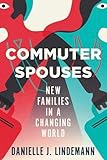Commuter Spouses : New Families in a Changing World / Danielle Lindemann.
Material type: TextPublisher: Ithaca, NY : Cornell University Press, [2019]Copyright date: ©2019Description: 1 online resource (198 p.)Content type:
TextPublisher: Ithaca, NY : Cornell University Press, [2019]Copyright date: ©2019Description: 1 online resource (198 p.)Content type: - 9781501731198
- 306.36 23
- HQ734 .L563 2019
- online - DeGruyter
| Item type | Current library | Call number | URL | Status | Notes | Barcode | |
|---|---|---|---|---|---|---|---|
 eBook
eBook
|
Biblioteca "Angelicum" Pont. Univ. S.Tommaso d'Aquino Nuvola online | online - DeGruyter (Browse shelf(Opens below)) | Online access | Not for loan (Accesso limitato) | Accesso per gli utenti autorizzati / Access for authorized users | (dgr)9781501731198 |
Browsing Biblioteca "Angelicum" Pont. Univ. S.Tommaso d'Aquino shelves, Shelving location: Nuvola online Close shelf browser (Hides shelf browser)

|

|

|

|

|

|

|
||
| online - DeGruyter Contradiction in Motion : Hegel's Organic Concept of Life and Value / | online - DeGruyter Early Southeast Asia : Selected Essays / | online - DeGruyter Failure to Protect : America's Sexual Predator Laws and the Rise of the Preventive State / | online - DeGruyter Commuter Spouses : New Families in a Changing World / | online - DeGruyter Glamour in Six Dimensions : Modernism and the Radiance of Form / | online - DeGruyter Conflict of Interests : Organized Labor and the Civil Rights Movement in the South, 1954–1968 / | online - DeGruyter The Foundation of Rome : Myth and History / |
Frontmatter -- Contents -- Acknowledgments -- Introduction -- 1. Apart Together: Individualism, Interdependence, and the Meaning of (Commuter) Marriage -- 2. Virtually Together: Space, Place, and Communication Technologies -- 3. Nobody’s Decision: The “Choice” to Live Apart -- 4. “They Don’t Have to Pick up Their Husbands’ Shoes”: Doing and Undoing Gender -- 5. Who Benefits from (Commuter) Marriage? -- 6. “But Are They Happy?” -- Conclusion -- Appendix A: Methodological Appendix -- Appendix B: Interview Schedule -- Appendix C: Follow-up Survey -- Notes -- References -- Index
restricted access online access with authorization star
http://purl.org/coar/access_right/c_16ec
What can we learn from looking at married partners who live apart? In Commuter Spouses, Danielle Lindemann explores how couples cope when they live apart to meet the demands of their dual professional careers. Based on the personal stories of almost one-hundred commuter spouses, Lindemann shows how these atypical relationships embody (and sometimes disrupt!) gendered constructions of marriage in the United States. These narratives of couples who physically separate to maintain their professional lives reveal the ways in which traditional dynamics within a marriage are highlighted even as they are turned on their heads. Commuter Spouses follows the journeys of these couples as they adapt to change and shed light on the durability of some cultural ideals, all while working to maintain intimacy in a non-normative relationship.Lindemann suggests that everything we know about marriage, and relationships in general, promotes the idea that couples are focusing more and more on their individual and personal betterment and less on their marriage. Commuter spouses, she argues, might be expected to exemplify in an extreme manner that kind of self-prioritization. Yet, as this book details, commuter spouses actually maintain a strong commitment to their marriage. These partners illustrate the stickiness of traditional marriage ideals while simultaneously subverting expectations.
Mode of access: Internet via World Wide Web.
In English.
Description based on online resource; title from PDF title page (publisher's Web site, viewed 26. Apr 2024)


